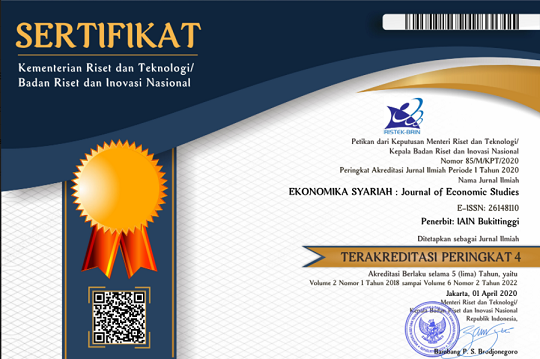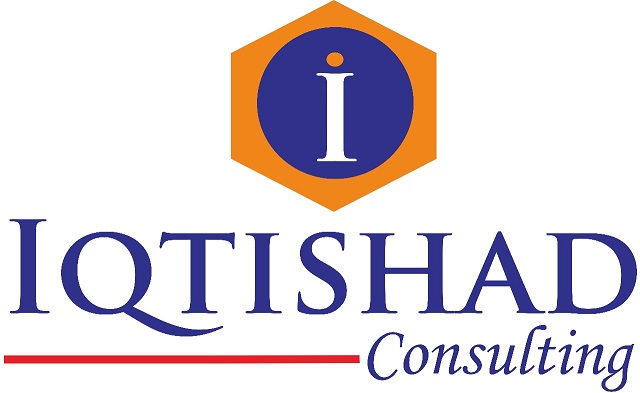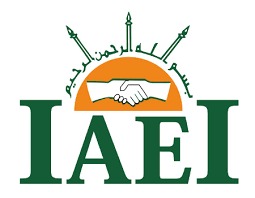Optimizing the Management of Zakat, Infaq, and Sadaqah for Post-Disaster Economic Recovery Through Local Policy Approaches
DOI:
https://doi.org/10.30983/es.v9i1.9645Keywords:
Economic Recovery, Management of Zakat , Post-Disaster, Local PolicyAbstract
This study aims to examine the mechanism of zakat, infaq, and sadaqah (ZIS) management implemented by the Nagari Sungai Pua Government Institution in the context of post-disaster economic recovery. Natural disasters in Nagari Sungai Pua have caused significant disruptions to the community’s financial stability. Many victims have lost their homes, which also served as places of business and livelihood, in addition to experiencing crop failures and other economic hardships. In response to these conditions, the Nagari Sungai Pua Government Institution has initiated a collective effort to regulate ZIS management through local policies tailored to the community's social context. This research is field-based, utilizing primary data collected through interviews with local government representatives, community leaders, and disaster survivors. The findings indicate that ZIS management in Nagari Sungai Pua is conducted systematically, fulfilling key aspects of planning, organizing, and reporting. The active involvement of local government in the collection, distribution, and utilization of ZIS demonstrates that policy-based zakat management effectively fosters social awareness and contributes to the economic recovery of disaster-affected communities.
Penelitian ini bertujuan untuk mengkaji mekanisme pengelolaan zakat, infaq, dan sadaqah (ZIS) oleh Lembaga Pemerintahan Nagari Sungai Pua dalam rangka pemulihan ekonomi masyarakat pasca bencana di Nagari Sungai Pua. Bencana alam yang terjadi di Nagari Sungai Pua diketahui telah menimbulkan kerugian yang siginifikan terhadap keberlangsungan ekonomi masyarakat. Sebagian besar korban bencana mengalami kehilangan tempat tinggal yang sekaligus sebagai tempat usaha, mata pencaharian, gagal panen, dan sebagainya. Kondisi ini mendorong Lembaga Pemerintahan Nagari Sungai Pua untuk secara kolektif mengatur mekanisme pengelolaan ZIS dengan kebijakan daerah yang relevan dengan kondisi sosial masyarakat. Penelitian ini merupakan penelitian lapangan. Data penelitian bersumber dari sumber primer, seperti wawancara dengan Lembaga Pemerintahan Nagari Sungai Pua, tokoh masyarakat, dan korban bencana. Hasil penelitian ini menunjukkan bahwa mekanisme pengelolaan ZIS di Nagari Sungai Pua dilakukan secara sistematis dengan indikasi terpenuhinya aspek perencanaan, pengorganisasian, dan pelaporan. Keterlibatan Lembaga Pemerintahan Nagari Sungai Pua dalam penghimpunan, penyaluran, dan pendayagunaan ZIS menunjukkan bahwa pengelolaan zakat berbasis kebijakan daerah telah membangun kepedulian sosial masyarakat setempat dalam memulihkan perekonomian masyarakat korban bencana alam.
References
Advunansyah, Muhammad Wildan Rezki, Nur Hidayah, and Aris Martiana. 2021. “Strategi Adaptasi Sosial Ekonomi Masyarakat Desa Wisata Jelok Pasca Bencana Alam Banjir Tahun 2017.” E-Societas: Jurnal Pendidikan Sosiologi 10 (5): 1–31. https://doi.org/10.21831/e-societas.v10i5.17183.
Akbar, Yusril Firmansyah, Hari Sukarno, and Nikmatul Masruroh. 2024. “Measuring The Poverty Of Productive Zakat Mustahik Using The Cibest Model.” EKONOMIKA SYARIAH: Journal of Economic Studies 8 (2): 176–91. https://doi.org/https://doi.org/10.30983/es.v8i2.8194.
Al-Labiyah, Andira Tsaniya, Lusi Nurul Aulia, Najuwa Aurel Annisa, and Lili Puspita Sari. 2023. “Peran ZIS Terhadap Peningkatan Kesejahteraan Sosial Di Indonesia.” Islamic Economics and Business Review (IESBIR) 2 (2): 168–85. https://doi.org/10.59580/iesbir.v2i2.6003.
Amirudin, Choirul, and Ahmad Fikri Sabiq. 2021. “Peran Ziswaf Dalam Memulihkan Ekonomi Umat Akibat Masa Pandemi Covid-19.” Baabu Al-Ilmi 6 (1): 38–47. https://doi.org/http://dx.doi.org/10.29300/ba.v6i1.2754.
Anugrah, Yuli Dwi Yusrani, dan, and Elin Dinata Putri. 2019. “Peranan Zakat , Infak Dan Sedekah ( ZIS ) Dalam Upaya Meningkatkan Perekonomian Di Kecamatan Jatiroto” 1 (2): 51–58.
Ashabul Fadhli. 2025. Manajemen Pengelolaan Zakat Di Era Teknologi Digital. Malang: Madza Media.
Ashfahany, Afief El, Awalul Dini Nur Hidayah, Lukmanul Hakim, and Mohd Shahid Bin Mohd Noh. 2023. “How Zakat Affects Economic Growth In Three Islamic Countries.” Journal of Islamic Economic Laws 6 (1): 45–61. https://doi.org/10.23917/jisel.v6i1.21242.
Asyahri, Yusuf, and Faqih El Wafa. 2022. “The Role of Productive Zakat in Reducing the Income Discrepancy in South Kalimantan Province.” Tasharruf: Journal Economics and Business of Islam 7 (1): 43. https://doi.org/10.30984/tjebi.v7i1.1738.
Azhar, Thifal, M. Shabri Abd. Majid, Sartiyah Sartiyah, and Taufiq C Dawood. 2022. “Impact of Disaster on Economic Performance of ASEAN-9: Does Philanthropy Help?” Jurnal Ekonomi & Studi Pembangunan 23 (1): 21–34. https://doi.org/10.18196/jesp.v23i1.12593.
Bayu Wardhana, Sigit Hermawan, Hadiah Fitriyah. 2023. “Strategy For Successful Implementation Of The Zakat.” Istinbath 22 (1): 149–67. https://doi.org/https://doi.org/10.20414/ijhi.v22i1.603.
Busnetty, Ida, and Yusuf Faisal. 2022. “Religious Role In Moderating Muzakki’s Decision To Issue Zakat.” Al-Intaj 10 (2): 213–38. https://doi.org/http://dx.doi.org/10.29300/aij.v10i2.4720.
Creswell, John W. 2017. Research Design: Pendekatan Kualitatif, Kuantitatif, Dan Mixed. Yogyakarta: Yogyakarta: Pustaka Pelajar.
Elfisha, Miko. 2024. “Pemprov Sumbar Tetapkan Status Tanggap Darurat Hingga 26 Mei 2024.” Https://Www.Antaranews.Com/, 2024. https://www.antaranews.com/berita/4105584/pemprov-sumbar-tetapkan-status-tanggap-darurat-hingga-26-mei-2024.
Fadhli, Ashabul, Desy Farina, Iljas Madi, and Juarsa Badri. 2021. “Pengelolaan Dana Zakat Dalam Bentuk Pendistribusian Sapi Oleh Pesantren Talago Dadok Berdasarkan Uu Pengelolaan Zakat.” IJLIL: Indonesian Journal of Law And Islamic Law 3 (2): 210–57. https://doi.org/https://doi.org/10.35719/ijlil.v3i2.123.
Farid, Ahmad Salman, Vijaya Kittu Manda, Sekolah Tinggi, Agama Islam, and Negeri Mandailing. 2024. “Public Communication and Policy Implementation : A Case Study on MUI ’ s Zakat Policy for YouTubers and Instagram Influencers” 9 (December): 193–203.
Furqani, Hafas, Ratna Mulyany, and Fahmi Yunus. 2018. “Zakat for Economic Empowerment (Analyzing the Models, Strategy and Implications of Zakat Productive Program in Baitul Mal Aceh and Baznas Indonesia).” Iqtishadia 11 (2): 391. https://doi.org/10.21043/iqtishadia.v11i2.3973.
Hasanah, Uswatun, Syamsul Anwar, and Misnen Ardiansyah. 2023. “Impact of Zakat-Based Business Capital on Mustahiq’s Welfare Post-Disaster in Sigi Regency.” Signifikan: Jurnal Ilmu Ekonomi 12 (1): 175–90. https://doi.org/10.15408/sjie.v12i1.25178.
Hidayatulloh, Muhammad Lutfi, Ade Nur Rohim, and Sahlan Hasbi. 2021. “The Efficiency and Effectiveness of The Distribution of Zakat Funds in Yogyakarta ’s Baznas.” Jurnal Ekonomi Islam 12 (2): 163–90. https://doi.org/10.32678/ijei.v12i2.294.
Indarningsih, Nur Aisyah, Suci Wulandari Siregar, Hasbi Hasbi, and Zahra Ramadhani Jasman. 2025. “Encouraging Sustainable Development through ZIS: The Role of Islamic Philanthropy in Reducing Poverty and Enhancing Socioeconomic Welfare.” International Journal of Zakat 10 (1): 54–79. https://doi.org/10.37706/ijaz.v10i1.598.
Karuni, Mudita Sri. 2020. “Pengaruh Dana Zakat Terhadap Pembangunan Manusia Di Indonesia.” IQTISHADUNA: Jurnal Ilmiah Ekonomi Kita 9 (2): 174–85. https://doi.org/https://doi.org/10.46367/iqtishaduna.v9i2.245.
Lubis, Rofuyah Abbiyah, and Hasan Sazali. 2024. “Productive Management of Zakat Funds for Mustahiq.” Istinbath 23 (1): 124–38. https://doi.org/https://doi.org/10.20414/ijhi.v23i1.735.
Luntajo, Moh Muzwir R, and Faradila Hasan. 2023. “Optimalisasi Potensi Pengelolaan Zakat Di Indonesia Melalui Integrasi Teknologi.” Al-’Aqdu: Journal of Islamic Economics Law 3 (1): 14–28. https://doi.org/http://dx.doi.org/10.30984/ajiel.v3i1.2577.
Maatisya, Yuki Fitia, and dan Aris Prio Agus Santoso. 2022. “Rekonstruksi Kesejahteraan Sosial Bagi Tenaga Kesehatan Di Rumah Sakit” 6 (3): 10337–55. https://doi.org/10.36312/jisip.v6i3.3395/http.
Marsa, Salsabila, and Laily Dwi Arsyianti. 2023. “The Impact of Productive Zakat on the Development of Mustahiq Businesses in Kecamatan Tualang.” Iqtishadia 16 (1): 49. https://doi.org/10.21043/iqtishadia.v16i1.16130.
Muttaqin, Zainal, and Mohammad Dendi Abdul Nasir. 2024. “Can Zakat Contribute to Achieving Sustainable Development Goals? A Case Study on Java Island, Indonesia.” Jurnal Ekonomi Syariah Teori Dan Terapan 11 (1): 35–53. https://doi.org/10.20473/vol11iss20241pp35-53.
Riadi, Selamat. 2020. “Strategi Distribusi Zakat Dan Pemberdayaan Mustahik: Studi Kasus Baznas Kota Mataram.” JURNAL SCHEMATA Pascasarjana UIN Mataram 9 (1): 125–36. https://doi.org/10.20414/schemata.v9i1.2264.
Rimpeng, Laila. 2022. “Zakat, Islamic Virtues, And Social Justice a Case of the Chiang Mai Zakat Fund in Thailand.” Al-Jami’ah 60 (2): 347–72. https://doi.org/10.14421/AJIS.2022.602.347-372.
Sabiq, Sayyid. 1983. Fiqh Al-Sunnah. Beirut: Beirut: Daar al-Fikr.
Safitri, Nadia, Rahmad Hakim, and Rahmi Amalia. 2023. “The Role of Zakat, Infaq and Sadaqah in the Post-Disaster Economic Recovery of MSMEs: Case Study at Baznas Central Sulawesi Province.” Iqtishodia: Jurnal Ekonomi Syariah 8 (1): 35–42. https://doi.org/10.35897/iqtishodia.v8i1.1125.
Sakti, Labuh Inderayana Eka, and A’rasy Fahrullah Fahrullah. 2022. “Pengelolaan ZIS Sebagai Upaya Meningkatkan Kesejahteraan Masyarakat (Studi Pada Baznas Kabupaten Jombang).” Jurnal Ekonomika Dan Bisnis Islam 5 (1): 106–19. https://doi.org/10.26740/jekobi.v5n1.p106-119.
Sastra, Yola. 2024. “Pencarian Korban Hilang Dalam ”Galodo” Di Sumbar Terhambat Cuaca Dan Material Sisa Banjir.” Https://Www.Kompas.Id/, 2024. https://www.kompas.id/baca/nusantara/2024/05/15/pencarian-20-korban-hilang-dalam-galodo-di-sumbar-terkendala-cuaca-dan-banyaknya-material-sisa-banjir.
Shamad Muis, Abdullah Ahadish, Muhammad Al Firdausi, Chairil Akbar, Shrouq Gamal, and Haitham Saleh. 2024. “Zakat, Economic Growth, and Poverty Alleviation: An Artificial Neural Networks Analysis.” International Journal of Zakat 9 (special): 56–70. https://doi.org/https://doi.org/10.37706/ijaz.v9iSpecial.467.
Sholeh, Maimun. 2020. “Pengaruh Pemberdayaan Zakat Dalam Meningkatkan Modal Manusia Dan Kesejahteraan.” Jurnal Ekonomi & Pendidikan 17 (1): 9–19. https://doi.org/10.21831/jep.v17i1.33841.
Sinaga, Fina Khairani, and Zulkarnain Abdurrahman. 2024. “Implementation of Zakat Funds Toward Poverty Alleviation Through the National Zakat Agency of Batu Bara District.” Istinbath 23 (1): 79–94. https://doi.org/10.20414/ijhi.v23i1.738.
Siswantoro, Siswantoro, and Ihsanul Ikhwan. 2023. “The Contribution of Islamic Social Finance to Economic Growth in Indonesia.” Review of Islamic Social Finance and Entrepreneurship 2 (1): 1–12. https://doi.org/10.20885/risfe.vol2.iss1.art1.
Suardi, Didi. 2021. “Makna Kesejahteraan Dalam Sudut Ekonomi Islam” 6: 321–34. https://doi.org/https://doi.org/10.36908/isbank.v6i2.180.
Sulaeman, Rifaldi Majid, and Tika Widiastuti. 2021. “The Impact of Zakat on Socio-Economic Welfare before COVID-19 Pandemic in Indonesia: A Quantitative Study.” International Journal of Zakat 6 (2): 75–90. https://doi.org/https://doi.org/10.37706/ijaz.v6i2.301.
Zuhaili, Wahbah. 1989. Al-Fiqh Al-Islami Wa Adillatuhu. Beirut: Beirut: Daar al-Fikr.
Downloads
Published
How to Cite
Issue
Section
Citation Check
License
Copyright (c) 2025 Ashabul Fadhli, Rina Susanti, Nike Apriyanti

This work is licensed under a Creative Commons Attribution-ShareAlike 4.0 International License.
Authors who publish with this journal agree to the following terms:
- Authors retain copyright and grant the journal right of first publication with the work simultaneously licensed under a Creative Commons Attribution-ShareAlike 4.0 International License that allows others to share the work with an acknowledgment of the work's authorship and initial publication in this journal.
- Authors are able to enter into separate, additional contractual arrangements for the non-exclusive distribution of the journal's published version of the work (e.g., post it to an institutional repository or publish it in a book), with an acknowledgment of its initial publication in this journal.
- Authors are permitted and encouraged to post their work online (e.g., in institutional repositories or on their website) prior to and during the submission process, as it can lead to productive exchanges, as well as earlier and greater citation of published work (See The Effect of Open Access).




